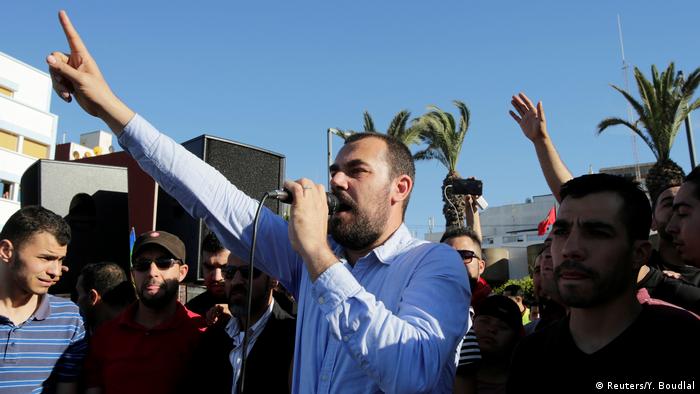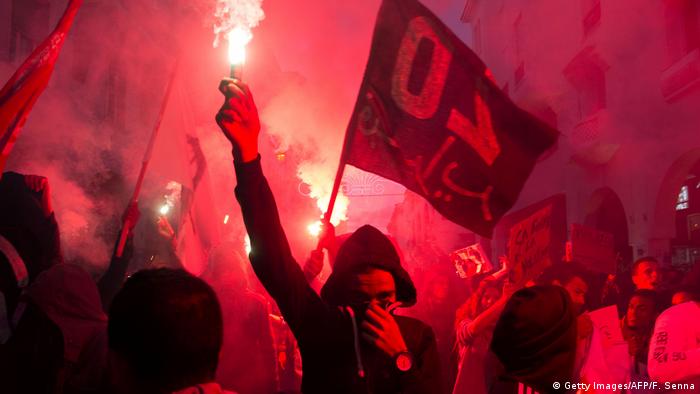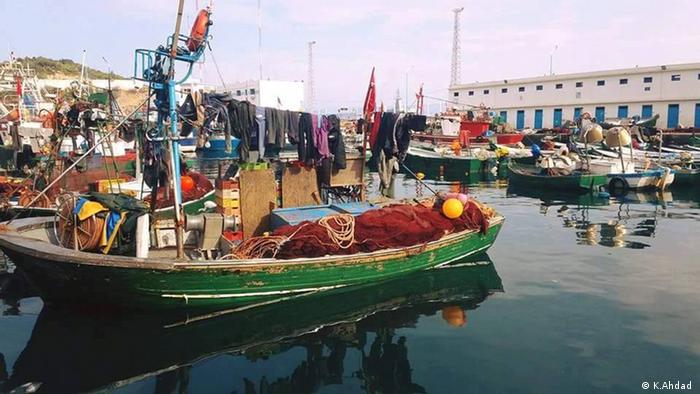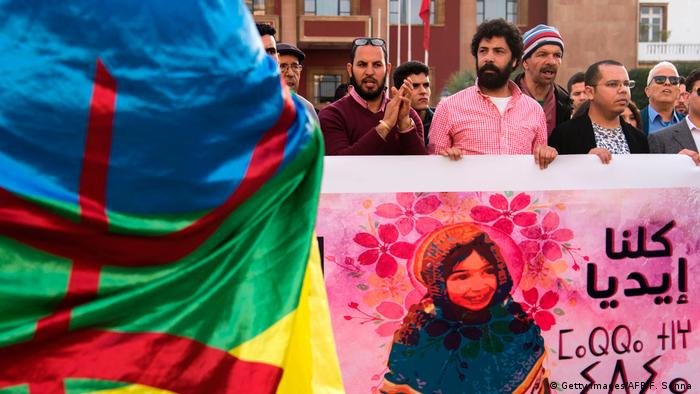After a short escape wet Zefzafi has been arrested, the leader of a protest movement in the North of Morocco. He loudly demands political and social reforms – and the opposite occurs in case of doubt, also imams.

Wet Zefzafi, the leader of the protest movement of Al-Hoceima
The explanations of the Imams did not want to accept. So wet Zefzafi and his followers broke on Friday, the sermon in the mosque, “Mohammed V” and asked the religious scholars to speech. This had just spoken about the prohibition of baiting in Islam. For the taste Zefzafis and his followers, he had done the clearly political intent, with the aim to discredit the growing protest movement in the eyes of the Public.
As in Morocco, the disturbance of a divine service is a punishable offence, appeared immediately to police officers in front of the house Zefzafis to arrest him. It came to riots between the police and the trailer of the protest leader. Zefzafi self-immersed. Earlier this week, he was arrested.
Death of a fish dealer
The protests in Al-Hoceima inflamed in October of last year. At the time, a fish dealer, Mohsen Fikri had been accused, by the police, he had not sold the goods properly. The fish threw you in a garbage. In order to save his goods, climbed Fikri in the Container and was killed by the crushing mechanics of the car. Since then, the protests in Al not tear-Hoceima. Last Sunday, there were drawn the third night in a row, hundreds of mostly young people protesting through the streets. Previously, there had been violent clashes between protesters and security forces. Individual protests were also reported from other cities in the Region.

After the death of Mohsen Fikris: protests against arbitrary state power
The protesters not only demanded social reforms, says Ali Anouzla, a Journalist of the Internet magazine “Lakum” (“For you”), in an interview with DW. They would also have political demands. “One of their essential claims is that the death of Fikri is completely cleared up.” The circumstances of the death, reported the Moroccan Internet portal “Tel Quel”, were not elucidated in the opinion of many demonstrators have so far sufficiently. The people demanded a full investigation and fast announcement of the results, Tel Quel. Many of the protesters alleged that the police had demanded a bribe from the fish dealer Fikri, did not want to pay or could.
Problems of a remote Region
“Hirak” (motion”) is called the protest initiative in Al-Hoceima. For quite some time, it has expanded its claims and is committed to for the release of all political prisoners in the Region. Also the small hashish farmers, legally, should no longer be followed. “The protesters also advocate for better work opportunities, a fairer distribution of the income and, in General, a good government work”, the government-critical Journalist Ali Anouzla.

Investment in the rural Region: the port of Al-Hoceima
The fishermen of the Region, Tel Quel, called for a fish processing plant. This would make their products internationally competitive. It would add further demands. The Region was hardly the case in many other rural areas in Morocco, the centres connected. “Wherefore, the protesters also demand the construction of a railway and a highway”, Tel Quel.
Look at Europe
The government have made a substantial investment in the rural regions, says Mohamed El-Ghali, a political scientist at the Cadi Ayyad University in Marrakech. “These regions are enjoying some of the privileges that other country don’t know the parts.” Add to this another Problem: the increased expectations of the population. “A lot of people in the country have friends or relatives who live in Europe. For this reason, they are acquainted with the European life conditions very well.” These are then compared with the own situation and the reality with their own life according to dissatisfied, Al-Ghali in an interview with DW.
Your location is not but only in comparison with Europe is difficult. The rate of illiteracy is in Morocco, a good 28 per cent, the unemployment rate for the year 2017 is estimated to be ten per cent – in fact, you could be far more. 15 percent of the population lives below the poverty line. In the “Corruption Perceptions Index” by Transparency International for the year 2015, Morocco ranked 88 of 168 countries in total. Accordingly, the protesters are also calling for a stronger and more determined fight against corruption.
Cultural identity or separatism?
It was striking that some of the protesters, the flag of their ethnic group, the Amazigh in Morocco, widespread Berber tribe, and swung. However, the Moroccan flag was missing during the protests, reported the observer.

Protests under the flag of the Amazigh
There were groups that tried to take the protest movement for their own purposes in hardware, says Mohamed El-Ghali. “You want to cause a separation between Arabs and members of the Amazigh, and contradict the identity of Morocco as a unified nation-state,” he criticizes. It was necessary to keep this from the “outside” of the movement referred to the identity of political motives as small as possible, so El-Ghali. Thus, he suggests that even neighboring countries might have in the protests in your hands with in the game. In Morocco, Similar is mostly Algeria.
The Journalist Ali Anzula rating of the phenomenon of the Amazigh flag is different. “The flags are a cultural sign of Identity, but the protesters do not represent the unity of the country at all in question,” he says. The fact that the protesters led by the Amazigh flag, you would just illustrate that you wanted to see your demands to your Region is restricted and by no means claimed to speak for the country as a whole – so the Interpretation of Anouzla.
Wet Zefzafi, the leader of the protest movement of Al-Hoceima, is now in custody. Dealing with him is likely to decide much of what the further course of the crisis of Al-Hoceima takes and how it goes with the protests.